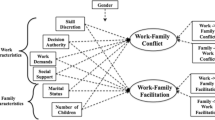Abstract
The present study tests a model of antecedents (i.e., the use of family-friendly policies, supervisor support, number of hours worked, having childcare responsibility) and consequences (i.e., job and family satisfaction) of work–family conflict and family–work conflict. As hypothesized, we found that the use of family-friendly policies, hours worked per week, and supervisor support were predictive of work–family conflict. In addition, as predicted, childcare responsibility and supervisor support were found to be related to family–work conflict. Work–family conflict was found to be related to both job and family satisfaction. Our research extends previous research in a number of ways. We believe that a particular strength of our study is it incorporated data gathered at different points in time and from more than one source.
Similar content being viewed by others
REFERENCES
Allen, T. D. (2001). Family-supportive environments: The role of organizational perceptions. Journal of Vocational Behavior, 58, 414-435.
Aryee, S., Fields, D., & Luk, V. (1999). A Cross-cultural test of a model of the work-family interface. Journal of Management, 25, 491-511.
Baltes, B. B., Briggs, T. E., Huff, J. W., Wright, J. A., & Neuman, G. A. (1999). Flexible and compressed workweek schedules: A meta-analysis of their effects on work-related criteria. Journal of Applied Psychology, 84, 496-513.
Bentler, P. M., & Wu, E. (1995). EQS for Windows. Encino, CA: Multivariate Software.
Boles, J. S., Howard, W. G., & Donofrio, H. H. (2001). An investigation into the inter-relationships of work family conflict, family work conflict and work satisfaction. Journal of Managerial Issues, 13, 376-390.
Brayfield, A. H., & Rothe, H. F. (1951). An index of job satisfaction. Journal of Applied Psychology, 35, 307-311.
Carlson, D. S., & Perrewe, P. L. (1999). The role of social support in the stressor-strain relationship: An examination of work-family conflict. Journal of Management, 25,513-540.
Fredriksen-Goldsen, K. I., & Scharlach, A. E. (2001). Families and Work: New Directions in the Twenty-first Century. New York: Oxford University Press.
Friedman, S. D., & Greenhaus, J. H. (2000). Work and Families: Allies or Enemies. New York: Oxford University Press.
Frone, M. R., Russell, M., & Cooper, M. L. (1992). Antecedents and outcomes of work family conflict: Testing a model of the work family interface. Journal of Applied Psychology, 77,65-78.
Frone, M. R. (2000). Work-family conflict and employee psychiatric disorders: The national comorbidity survey. Journal of Applied Psychology, 85, 888-895.
Geiger, K (1989). Long-held bias impedes efforts to support work/family needs. Business Link, 4,4-5.
Goff, S. J., Mount, M. K., & Jamison, R. L. (1990). Employer supported child care, work/ family conflict, and absenteeism: A field study. Personnel Psychology, 43, 793-809.
Grandey, A. A., & Cropanzano, R. (1999). The conservation of resources model applied to work family conflict and strain. Journal of Vocational Behavior, 54, 350-370.
Greenhaus, J. H., Callanan, G. A., & Godshalk, V. M. (2000). Career management. Stamford, CT: International Thompson Publishing.
Hammer, L. B., Bauer, T. N., & Grandey, A. A. (2003). Work-family conflict and work-related behaviors. Journal of Business and Psychology, 17, 419-436.
Hoyle, R. H., & Panter, A. T. (1995). Writing about structural equation models. In R. H. Hoyle (Ed.), Structural Equation Modeling (pp. 158-176). Thousand Oaks, CA: Sage.
Judge, T. A., Bono, J. E., & Locke, E. A. (2000). Personality and job satisfaction: The mediating role of job characteristics. Journal of Applied Psychology, 85, 237-249.
Judge, T. A., Boudreau, J. W., & Bretz, R. D. (1994). Job and life attitudes of male executives. Journal of Applied Psychology, 79, 767-782.
Judiesch, M. K., & Lyness, K. S. (1999). Left behind? The impact of leaves of absence on managers' career success. Academy of Management Journal, 42, 641-651.
Kline, R. B. (1998). Principles and Practice of Structural Equation Modeling. New York: The Guilford Press.
Kopelman, R. E., Greenhaus, J. H., & Connolly, T. F. (1983). A model of work, family, and interrole conflict: A construct validation study. Organizational Behavior and Human Performance, 32, 198-215.
Kossek, E. E., & Nichol, V. (1992). The effects of on-site child care on employee attitudes and performance. Personnel Psychology, 45, 485-509.
Kossek, E. E., & Ozeki, C. (1998). Work family conflict, policies, and the job-life satisfaction relationship: A review and directions for organizational behavior-human resources research. Journal of Applied Psychology, 83, 139-149.
MacCallum, R. C. (1995). Model specification: Procedures, strategies, and related issues. In R. H. Hoyle (Ed.), Structural Equation Modeling, Thousand Oaks, CA: Sage Publications.
Netemeyer, R. G., Boles, J., & McMurrian, R. (1996). Development and validation of work family conflict and family work conflict scales. Journal of Applied Psychology, 400-409.
Nielson, T. R., Carlson, D. S., & Lankau, M. J. (2001). The supportive mentor as a means of reducing work family conflict. Journal of Vocational Behavior, 59, 364-381.
Shinn, M., Wong, N.W., Simko, P.A., & Ortiz-Torres, B. (1989). Promoting the well-being of working parents: Coping, social support, and flexible job schedules. American Journal of Community Psychology, 17,31-35.
Solomon, C. (1994). Work/family's failing grade: Why today's initiatives aren't enough. Personnel Journal, 73,72-87.
Thomas, L. T., & Ganster, D. C. (1995). Impact of family-supportive work variables on work family conflict and strain: A control perspective. Journal of Applied Psychology,80,6-15.
Thompson, C.A., Beauvais, L. L., & Lyness, K. S. (1999). When work-family benefits are not enough: The influence of work family culture on benefit utilization, organizational attachment, and work-family conflict. Journal of Vocational Behavior, 54, 392-415.
Warren, J. A., & Johnson, P. J. (1995). The impact of workplace support on work family role strain. Family Relations, 44, 163-169.
Author information
Authors and Affiliations
Rights and permissions
About this article
Cite this article
Frye, N.K., Breaugh, J.A. Family-Friendly Policies, Supervisor Support, Work–Family Conflict, Family–Work Conflict, and Satisfaction: A Test of a Conceptual Model. Journal of Business and Psychology 19, 197–220 (2004). https://doi.org/10.1007/s10869-004-0548-4
Issue Date:
DOI: https://doi.org/10.1007/s10869-004-0548-4




